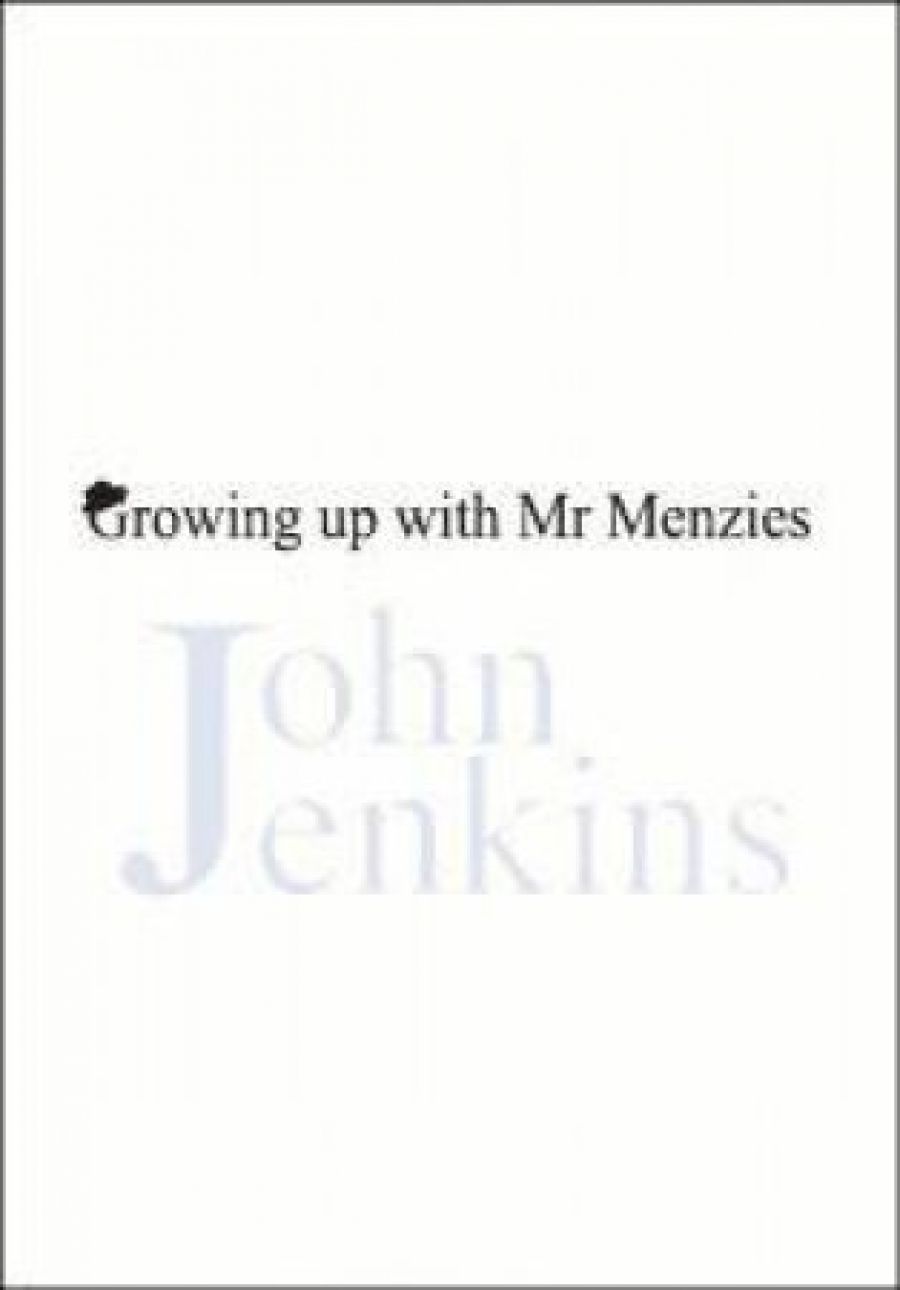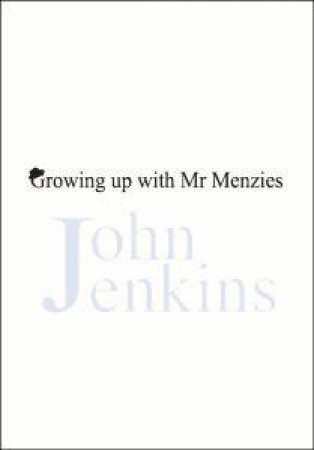
- Free Article: No
- Contents Category: Poetry
- Review Article: Yes
- Article Title: Creature of his time
- Online Only: No
- Custom Highlight Text:
John Jenkins (especially in his collaborations with Ken Bolton) is normally thought of as an ‘experimental’ poet, but in Growing up with Mr Menzies he is on more traditional ground. Born in 1949 in Melbourne, Jenkins has created the fictional character Felix Hayes, who was also born in 1949 in Melbourne. In a series of poems, he traces Felix’s life from birth through to early adolescence. Rather neatly, this period of his life fits with the so-called ‘Menzies era’; Robert Menzies returned to power in 1949 and left it (voluntarily) in 1966. It is thus the parallel story of two characters, one large and looming, the other small but getting bigger.
- Book 1 Title: Growing Up with Mr Menzies
- Book 1 Biblio: John Leonard Press, $24.95 pb, 160 pp
- Book 1 Cover Small (400 x 600):

- Book 1 Cover (800 x 1200):

Jenkins’s Menzies is more symbolic than psychological, but Jenkins does present him as fully human, albeit flawed and a creature of his times (which he partly created, locally speaking). ‘Pig-Iron Bob’ is an easy target for poets of the left, but Jenkins carefully avoids this, making him more an ironic figure, even a tragic one.
An early but important poem in the Menzies sequence shows him sailing ‘Home’ to Britain in 1939:
His hands are dainty,
small and plump, so he tucks them above deep cuffs
and holds them in a tailored pocket. Vest, double breast,
neat edges of a handkerchief ... silver-templed exemplar
of a world made for black and white, he leans a notebook
on the rail and writes ... ‘Home soon, for the first time!’
Clearly, Jenkins is interested in getting inside Menzies’ head and not just using him as caricature. Nevertheless, the prime minister remains a marginal figure in the book compared to the young Felix, who grows up with his older sister in public housing on the outskirts of Melbourne.
With Felix, whom the poet rather unconvincingly declares in a prefatory note not to be his alter ego, we start right at the beginning. ‘Your first word is a cry, from lips dribbling / afterbirth ... Another blubbing bub stares wide at nothing.’ Felix moves on slowly, with details of his teddy bear, his language acquisition, memories of the house and backyard, kindergarten, primary school and, eventually, the early years of high school. Impacting on him, but not too severely, is his parents’ unhappy marriage. Felix and his mother and sister stay for a time in what he calls the ‘Orphanage’, but then, ‘We went back to Box Hill South and Dad. / And they were quieter then and always said / they did it “for the children’s sake”.’
Like most writers, Jenkins is forgivably interested in his own childhood (remember Hemingway’s dictum about ‘what a writer needs most is an unhappy childhood’?). What saves this account from being narcissistic, however, is the poet’s seeing it consistently in a political and sociological context. Felix’s mother is something of a ‘red ragger’ and takes her kids to the ‘Eureka Youth Camp ... a cheap / holiday for a week or two in summer’. His father, a hard-working tailor, ‘gets religion’ and is annoyed with his son’s nascent scepticism. He certainly inflicts the excessive punishments of the period: ‘When I’m late, he meets me / at the gate and pins me down. Red welts on / my legs until I’m bawling.’ But they have good times, especially on fishing trips in the father’s boat.
Felix remembers the Eureka camps with pleasure, having been ‘prised from // a Dad and Mum clinging, in their happy misery, as close as hydrogen / atoms in an Aussie nuclear family in the suburbs’. But there are also harsher episodes, such as the way Felix is severely bullied for a time until he figures out an effective way to hit back.
Much of the book recalls the physical freedom that children were allowed in those days; Felix and his mates roam under bridges, in abandoned brickworks, deserted houses and so on. Such details are probably interchange-able with hundreds of thousands of other childhoods at the time, but this doesn’t diminish their interest.
Meanwhile, counterpointing all this, we have the Menzies poems, reaching into his more worrying moments (about, for instance, a nuclear exchange between Russia and the West) but also displaying the off-hand cynicism with which he was able to ‘kick the Commo can’ and defeat Labor in successive elections. One of the more eerie of these poems is ‘Spender, Sensible Chap’, in which the great man and his foreign minister ruminate in a Canberra res-taurant over a nuclear future for Australia, both with elec-tricity and our own bomb. ‘The privileged air was full of silvery talk, / cutlery on plates. Puddings came. And then they ate.’
Another disconcerting moment in the book is when the Victorian attorney-general, Arthur Rylah, visits the girls’ home where Felix’s sister, Jasmin, at fourteen, has been locked up (with her father’s agreement) for being uncontrollable and in moral danger. Rylah’s voice is heard ‘like an old scratched record skips / its grooves, repeating: “We will nip every budding / of illicit sex and delinquency”.’ It is a chastening contrast to the more idyllic sections where Felix is running about enjoying his freedom.
For those in the same age cohort as John Jenkins, and perhaps for those rather younger, Growing up with Mr Menzies will be an intriguing place to roam around in. Menzies himself is not the least of its interests.


Comments powered by CComment